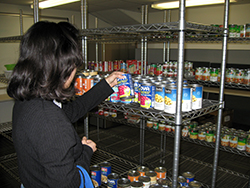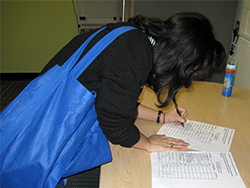American University’s Food Pantry Battles Student Food Insecurity Daily, Year-Round
By Hunter B. Martin, NASFAA Staff Reporter
Around the nation food insecurity among college students is drawing increased concern as tuition prices rise, the wealth gap increases, and more low-income and first-generation students enroll in higher education. In response to high levels of food insecurity, there is a growing trend of colleges and universities around the country opening on-campus food pantries.
 One of those institutions is American University (AU) in Washington, D.C.
One of those institutions is American University (AU) in Washington, D.C.
"Food security on college campuses is critically important to the success of not only the core academic mission of colleges, but also to the notion of whole person development and community building," said Tony Hollinger, the director of military-affiliate support and special initiatives with the Office of Campus Life.
A defining trait of food insecurity is that it does not always mean students are going entirely without food. Instead, students struggling to afford meals may turn to fast food or other cheap and often highly processed options. Food insecurity can lead to higher levels of stress, sleep loss, and decreased levels of energy in students, research has shown.
AU's food pantry, The Market, was created after AU conducted a survey in December 2016 of its approximately 13,800 students and found that, of the 700 respondents, "too many students went hungry at least once a semester … because they couldn't afford to eat," according to AU's website.
The AU food pantry is unique because it is open year-round, every day, for 18 hours a day. According to College and University Food Bank Alliance (CUFBA) data from September 2018, the majority of campus-based food pantries are only open a handful of days of the week at more limited hours.
Students access The Market by filling out an online form that is linked to their AU email and ID number. Once a student's card is activated they can access The Market, located in the basement of one of the on-campus dorms, between 6:00 a.m. to noon and 2:00 p.m. to 2:00 a.m. The pantry is only closed during restock periods, during which time students can help stock shelves and keep the space clean.
 During open hours, AU students are able to browse the unmonitored food pantry in relative privacy; the pantry runs on the honor system with no restrictions other than the encouragement to take the needs of other students into consideration. Students are asked — but not required — to also fill out a form with the items they collected for restock purposes.
During open hours, AU students are able to browse the unmonitored food pantry in relative privacy; the pantry runs on the honor system with no restrictions other than the encouragement to take the needs of other students into consideration. Students are asked — but not required — to also fill out a form with the items they collected for restock purposes.
Since opening in September 2017, The Market has activated about 550 student IDs, some of whom may have since graduated. Still, food pantry administrators are working to ensure adequate service based on usage data and user feedback versus individual student tracking, according to Hollinger.
Many students suffering from food insecurity often feel reluctant to reach out to their institutions for support due to stigma associated with low food security. That is why a foundational principle of AU's food pantry is to "ensure student user comfort," Hollinger said. AU seeks to spread awareness for The Market primarily through word of mouth between students and campus departments that students regularly engage with, such as the Financial Aid Office, the Student Health Center, the Health Promotion and Advocacy Center, the Student Counseling Center, and the Dean of Students Office.
"Fortunately, all categories of AU community members — staff, faculty, administrators, and students — have embraced the food pantry and help to spread the word," Hollinger said.
That's just how one graduate student, who wished to remain anonymous, said she learned about the pantry.
"I never thought of a campus having a food pantry until a friend of mine told me about it," the student said. "Since we are graduate students, we don't get a meal plan and usually are on a tight budget. I decided to sign up and check it out for myself."
Like many other food pantries, The Market stocks mostly canned goods and non-perishable items like pasta, ramen, oatmeal, and occasionally supplies household supplies such as bar soap, femine hygiene products, and tin foil.
"I was surprised to see various options for protein like tuna and beans [at the pantry]. There were different items to choose from that students could actually make meals out of if they supplement what they get from the pantry with fresh produce," the student said.
The Market also houses two refrigerators which will occasionally have food items such as yogurt, frozen veggies, or other frozen foods.
The Market is supplied through partnerships with the Capital Area Food Bank, AU's Center for Community Engagement and Service, and CUFBA. Last year, at the end of the fall semester, AU Dining donated the value of all unused meal swipes — up to $10,000 — to The Market.
The AU Library also helps promote awareness and generate supplies through the "Food for Fines" program, in which students can bring canned goods or other non-perishable food items to reduce library fines.
"This is a great start for AU in battling food insecurity and I think they will achieve their goals if they get more student input and data," said Nazli Togrul, a recent graduate of AU.
During her time as an undergraduate Togrul covered The Market for AU's student paper, interviewing students and administrators.
"I think that the pantry is a great resource for the AU community overall, but it has a long way to go to be the most helpful it can be for the students who need it," Togrul said. "There are still kinks to be worked out in the system, such as having a variety of food available for students and an expansion of [products that meet] dietary restrictions."
Publication Date: 11/8/2019






You must be logged in to comment on this page.